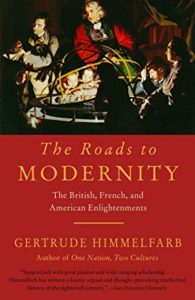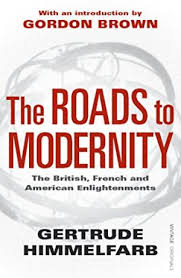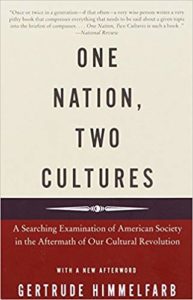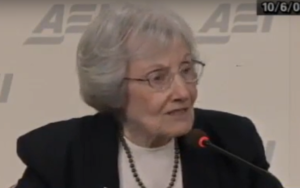While political scientists tend to focus on institutional reforms as a route to democratic renewal, there are also more old-fashioned ways to boost civic fabric, The FT’s Gillian Tett argues.
The historian Gertrude Himmelfarb – who died this week at the age of 97 – didn’t fear immorality so much as demoralization, the sense that our age has lost a moral vocabulary and with it the ability to think subtly about moral matters, David Brooks writes for The Atlantic. A great deal, she wrote, is lost when a society stops aiming for civic virtue and is content to aim merely for civility.
 “In Edwardian and Georgian England,” Himmelfarb wrote, “the moral revolution was confined to a relatively small (although influential) group of ‘free spirits,’” Yuval Levin writes for National Review. It was only in her own time that she thought that revolution was finally becoming altogether democratized:
“In Edwardian and Georgian England,” Himmelfarb wrote, “the moral revolution was confined to a relatively small (although influential) group of ‘free spirits,’” Yuval Levin writes for National Review. It was only in her own time that she thought that revolution was finally becoming altogether democratized:
The idea of moral liberation is no longer the preserve of an elite but is rapidly becoming the common ground of an entire generation. Having finally used up the moral capital of the Victorians, we find ourselves more and more thrown back upon the one idea which appears to be of unquestionable validity, the idea of liberty.
Victorian values “depended on no special breeding, talent, sensibility, or even money. They were common, everyday virtues, within the capacity of ordinary people,” Himmelfarb insisted in The Roads to Modernity: The British, French and American Enlightenments. “They were the virtues of citizens, not of heroes or saints – and of citizens of democratic countries, not aristocratic ones”.
 While widely identified as a conservative, many on the left admired her work, including former British Labour Party Prime Minister Gordon Brown, who wrote in the introduction to the British edition of Roads to Modernity: “I have long admired Gertrude Himmelfarb’s historical work, in particular her love of the history of ideas.”
While widely identified as a conservative, many on the left admired her work, including former British Labour Party Prime Minister Gordon Brown, who wrote in the introduction to the British edition of Roads to Modernity: “I have long admired Gertrude Himmelfarb’s historical work, in particular her love of the history of ideas.”
In her 1968 collection of essays, “Victorian Minds,” she praised the role that evangelical Christianity had played in supporting mass democracy, The Times adds. The book was nominated for a National Book Award.
In that book and several subsequent collections, particularly “Marriage and Morals Among the Victorians” (1986), Himmelfarb contended that the old virtues—temperance, chastity, industry—didn’t repress individual creativity. Instead they enabled a century of cultural flourishing and political stability, The Wall Street Journal reports.
 Two quotes from Himmelfarb express insights that run throughout João Carlos Espada’s The Anglo-American Tradition of Liberty: A View from Europe, James H. Nichols, Jr. wrote for the NED’s Journal of Democracy:
Two quotes from Himmelfarb express insights that run throughout João Carlos Espada’s The Anglo-American Tradition of Liberty: A View from Europe, James H. Nichols, Jr. wrote for the NED’s Journal of Democracy:
- “The true ‘miracle of modern England’ (Halévy’s famous expression) is not that she has been spared revolution, but that she has assimilated so many revolutions – industrial, economic, social, political, cultural—without recourse to Revolution.”
- And soon after: “The British and American Enlightenments [in contrast to the French Enlightenment] were latitudinarian, compatible with a large spectrum of belief and disbelief. … And for both, religion was an ally, not an enemy.” (pp. 53–54).
In a 1995 essay, “Beyond Social Policy: Re-Moralizing America,” she argued that welfare reform could be effective only if policy makers returned to firmer moral convictions, the WSJ’s James R. Hagerty adds.
 “In 19th-century Britain,” she wrote, “Victorians spoke the language of morality because they believed in the reality of virtues—virtues as the guiding principles of public as well as private affairs. In this sense there was a basic consensus on social affairs.”
“In 19th-century Britain,” she wrote, “Victorians spoke the language of morality because they believed in the reality of virtues—virtues as the guiding principles of public as well as private affairs. In this sense there was a basic consensus on social affairs.”
“We have tried ‘value-free’ social policies and they do not work,” she wrote. “Having made the most valiant attempt to ‘objectify’ the problem of poverty, to see it as the product of impersonal economic forces, we are discovering that the economic aspects of that problem are inseparable from the moral and personal ones.”
During the 1960s, Himmelfarb and her husband Irving Kristol became “anti-intellectual intellectuals” who abhorred ivory-tower hubris and admired the intrinsic wisdom of the common man, Jonathan Bronitsky wrote in a National Affairs essay, The Brooklyn Burkeans, Accordingly, they privileged the original “republican philosophy” of America with its emphasis on liberty and virtue over the country’s burgeoning “democratic dogma” with its emphasis on parity and tolerance.
Yet progress can be threatened not just by complacency but by tribalism, authoritarianism and science denial, argues Harvard’s Steven Pinker. Such insults to Enlightenment ideals undermine concrete measures that have driven progress in the past, including democratic checks and balances, free trade, environmental regulation and international agreements, he writes for The Financial Times.

YouTube screen capture
She challenged the idea that the poor and working class were more liberal than the rich and warned against the post-Victorian Bloomsbury circle of Virginia Woolf, E.M. Forster and other artists and intellectuals, analyst Hillel Italie writes.
“Today more than ever, we have reason to be wary of the kind of ‘civilization’ celebrated by Bloomsbury, which dismissed conventional morality as ‘a ridiculous, absurd and antiquated fashion,’” she wrote in 1985.
Paradox of liberalism
Himmelfarb found the Victorians particularly instructive regarding two sets of questions she thought were essential to her own time and place, Levin adds:
- The first was what she would later (in a biography of John Stuart Mill) call “the paradox of liberalism” — namely that in prioritizing individual liberty above all other political goods, modern liberalism threatened to undermine the moral foundations of individual liberty, and therefore of its own strength.
- The second involved the significance of intellectuals in the public lives of free societies. Himmelfarb was fascinated by the role that writers, scholars, journalists, critics, and academics played in politics and culture, and nearly all of her work takes up that subject in one way or another.
On Looking Into the Abyss: Untimely Thoughts on Culture and Society (1994) argued that Bloomsbury ‘s anti-bourgeois bohemian culture became democratized after the Second World War with the huge expansion of higher education and the growth in material affluence, adds one observer.
“Virtues are very hard. Vices are easy to come by. Once young people had the leisure and money to indulge themselves, it was almost inevitable that they do it.”
I’ve never met anyone with a greater disdain for bullshit of any kind, wrote Commentary editor John Podhoretz.
She was a believer in, indeed maybe the foremost American intellectual expostulator, of the highest of human sentiments—the ones that come in tandem with a deep reverence for tradition, he added. But she disdained sentimentality; she rolled her eyes at grandiloquent pronouncements whose purpose was to demonstrate the pronouncer’s nobility of character.







